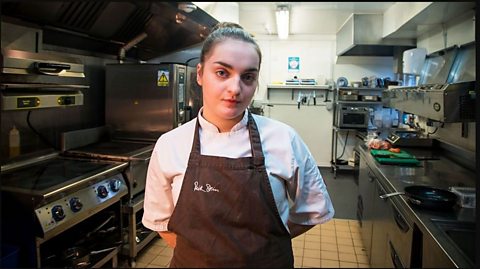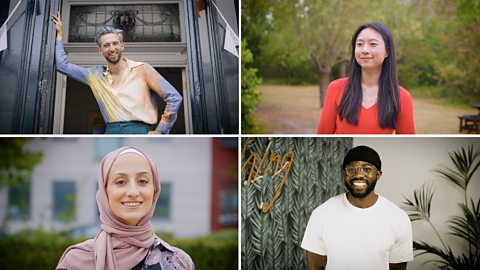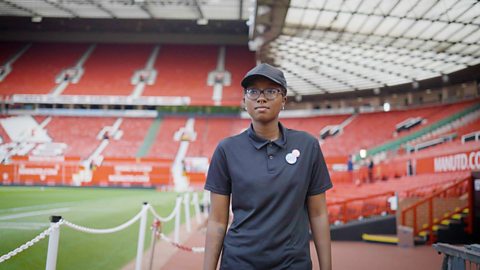Meet Numra, a head chef in her own catering company based in south London. Find out more about how she uses Urdu in her role. Part of our Bitesize world of work series.
Numra is the creator and head chef of Empress Market. It's a catering company that cater South Asian food for events and private clients. Numra uses Urdu quite a lot, including when reading recipes and dealing with food suppliers.
Working as a chef, no single day is the same. It's always pretty unpredictable.
Numra:
Mera naam Numra hai aur mai khansamaa hoon. Mai catering kaa kaam karti hoon. - My name's Numra and I'm a chef. I run my own catering company.
My name's Numra and I'm a chef. I run my own catering company, Empress Market. I'm a creator and a head chef. I run food stores, I cater private events, I host supper clubs.
Mr Suleiman:
Assalamualaikum. Kiya haal hai jee Aap Ka? - Hello. How are you?
Numra:
Walaikum assalam. Theek hoon. Aap kaisai hain? - Hello, I’m well. How are you?
Mr Suleiman:
Alhamdulillah. Theek hain. - I’m well thankfully.
Numra:
No day's ever really the same. There's some days which I'm just doing admin, I'm glued to the desk and there's those days where I'm in the kitchen, I'm on my feet all day. I've also got a team that works with me now. They're freelance chefs, so I can make sure that they're kind of following my vision and making sure that they're actually cooking and plating the food that I've designed for my clients.
Numra:
Kahrri Kahrri hain ye tau bilkul. - It’s still quite firm right now.
Salma:
Haan, nahin, tauhrri si aur galjai gi naa. - Yes, but it will begin to tenderise.
Numra:
Haan. - Oh yes.
Numra:
Urdu plays a really big role in my work. Because I cook a lot of my heritage dishes, the Pakistani and Indian recipes handed down through generations, it's basically a lot of time spent with my grandmother, learning how to cook these dishes and actually transcribing them, understanding how to cook them when I'm cooking them with my mum and also kind of understanding the turns of phrase that she uses to cook those different dishes and putting them into practice.
The second way I use Urdu in my work is communicating with my venders, ordering the stock. I've got a really lovely relationship with the guys where I can just name a dish and they'll sometimes get me the ingredients I need, especially when I'm in a panic and I can't think straight.
Bilkul charbi kam hau. - The fat should be minimal.
Also, some of my clients, I get to speak to them in Urdu and I can bond with them, and they understand that I know the food that I'm cooking, is something that's important to me. So, it's really all about community building.
Tau mai ne Aap kau phone karna thah, mai ne cheezai mangaani hain. - So, I called you because I need to order some stock.
I think my favourite thing about my job is being creative and bringing a menu to life. I mean, I'll be honest, us chefs we can be a bit fussy, but we take these ingredients, we chop them up, we mix them up and we create this magic, like we make this delicious food that people can enjoy, they create all the perfect yummy sounds and get excited and that's where the buzz is. I think that's where the greatest joy is for me. You know, feeding people and making them happy.
Salma:
Numra chohtti elaichi nahin ddaali tum nai. - Numra you haven’t written green cardamom.
Numra:
Haan, chohtti elaichi! - Oh yes, green cardamom!
Salma:
Vo ddaal dau. - Do add that!
Numra:
My biggest challenge has been my impostor syndrome. For years, I wouldn't even call myself a chef. I'd just say I was cooking for a living. The second challenge I suppose, would be purely logistical. I never worked my way up in the food industry working in restaurants, I didn't go to business school, so I had to kind of make those mistakes and then learn from them. I had to learn how to manage my team by being around people and through trial and error, really, and the final challenge I'd probably say is the prejudice I've faced as a brown woman cooking my heritage food. You know, a lot of times people have put down Pakistani food as not standing on par with the great classics and I've really had to work hard in creating a place for myself. I used to be really insecure about my cooking before, but now I'm really proud of it and my customers enjoy it too.
Walaikum assalam. Theek haun jee. Aaj Pasande ka ghosht chaiye. - I’m well thank you. I need meat cut for Pasanda today.
So, I didn't start in the industry with formal qualifications in the culinary world. I worked my way up in my food business and I've tried different techniques. Much later down the line, I went to culinary school and I kind of formalised my practice and formalised my technique.
The actual schooling I've had is in documentary filmmaking. I did my undergraduate and master’s in Film, but I completely changed my career. While I don't have any formal qualification speaking Urdu, I've grown up speaking the language, my parents have spoken to each other. They used to speak to me and that's how I have created a bond with my heritage, is through this language. Thank you.All right.
Allah-hafiz. - Goodbye.
The most important thing to being a chef is getting the experience. Learn the basics. I mean, I'm not going to ask you to make biryani if you don't know how to boil rice. Learn how to do that, make the mistakes. Do it again and again and again until you get it right, and even then, if you make a mistake, you're only going to learn from that. Work at the restaurants that you like, get apprenticeships, shadow your favourite food writers if you can, get experience with food stylists. That is where you're going to learn how to be a chef and work in the hospitality industry.
I wish I'd been easier on myself coming up in this industry. I've always been really, really hard on myself. I’ve always berated myself when I've made mistakes along the way, but I think make those mistakes because that's when you're going to really learn the key skills and the key lessons.
Salma:
Nahin, mai ne kabhi nahin pakai. - No, I’ve never cooked with it.
Numra:
Zaminkand kiya hai? - What is Zaminkand?
My top tip for learning a new language is the same as being in the kitchen. Practise, practise, practise. Get out the phrase books, watch foreign films. You never know where it will take you.
- Numra thinks that certain skills are essential to be a good chef. You need perseverance, focus, listening skills, the ability to follow instructions and the humility to learn from your mistakes
- Her working days can be very different. Sometimes, it'll be mostly in the office, sitting at a desk organising events, ordering equipment and stock and communicating with suppliers. While on other days, she'll be cooking, managing her freelance staff and dealing with customers. As a chef, no day is ever the same!
- Numra learnt Urdu at home with her parents. Urdu is at the heart of Numra's business. All her recipes come from her Pakistani and Indian heritage. She will have the basic recipe written down but since cooking is more traditionally part of an oral history, she will be teaching and delegating to her team in person. Talking things through is key. Urdu is also essential in the way she speaks to her food suppliers when she discusses with them the type of recipes she's planning to do
- Numra's favourite part of her job is to see a menu plan come together and being able to bring it to life and to hear the lovely yummy sounds of her customer eating her food
- Originally, Numra was a documentary maker and studied Film at undergraduate level and master's level, before she started her own business. She's always been interested in story-telling and feels she reflects her heritage through her food. She went to culinary school later in her career
- Numra had to face a few personal challenges. She initially had imposter syndrome and fought hard to develop her own voice in her food. She also worked hard to learn the trade and get to manage her team efficiently. The final challenge is the prejudice she faced as a woman of colour in the food industry selling heritage food. She was told that Pakistani food didn't stand shoulder to shoulder with the great cooking classics. She used to feel insecure but now she's really proud of her cooking and her customers love it!

Top tips
- If you want to become a chef, learn the basics first. Don't try to cook a biryani if you can't manage boiled rice yet! Keep trying over and over again. You will not perfect a dish the first time around
- Try to keep the pressure on yourself as low as possible
- Keep an open-mind when you're learning a language. Embrace it as a learning experience that can lead you to really exciting things in the future.

What to expect if you want to be a chef
Chef average salary: £15,000 to £30,000 per year (£23,000 to £50,000 per year for head chef)
Chef typical working hours: 40 to 45 per week
What qualifications do you need to be a chef?
You could get into this role via a university course, a college course – such as a T-level (England-only) – an apprenticeship or by working towards the role via other jobs.
This information is a guide and is constantly changing. Please check the National Careers Service pages for chef and head chef for the latest information and all the qualifications needed. (Sources: LMI for All, National Careers Service).
For careers advice in all parts of the UK visit: National Careers Service (England), nidirect (Northern Ireland), My World of Work (Scotland) and Careers Wales (Wales).

How to become a chef. collection
A collection of chef job profiles and information about what the role entails, from BBC Bitesize Careers.

How I use modern languages in my career. collection
Find out more about careers that use modern languages.

Charis: a back of house assistant. video
Charis works in the kitchens at Manchester United Football Club.
